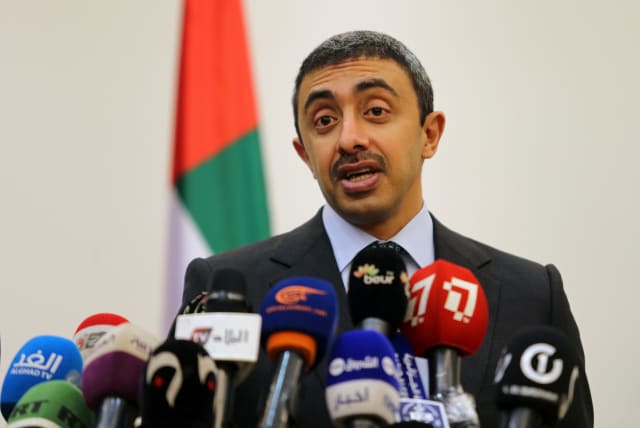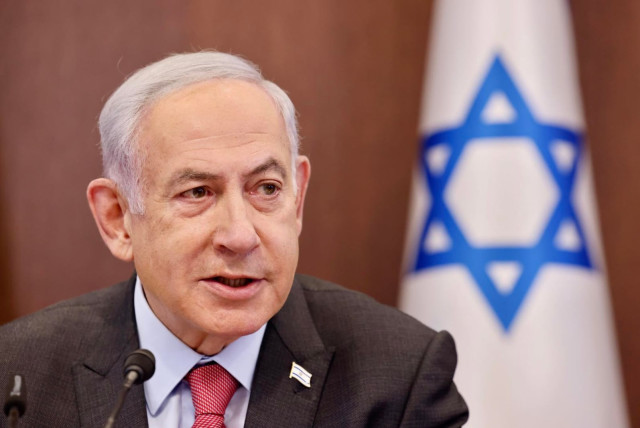Gulf leaders take issue with claims that Gulf states will lead postwar Gaza administration

UAE Foreign Minister Abdullah bin Zayed Al Nahyan insisted on Saturday that his country would not participate in a new civil administration in Gaza.
Amid faltering Gaza hostage deal negotiations and in the wake of last month’s direct exchange of fire between Iran and Israel, leaders of Gulf states are increasingly distancing themselves from US and Israeli leaders in an attempt to safeguard their own interests.
UAE Foreign Minister Abdullah bin Zayed Al Nahyan insisted on Saturday that his country would not participate in a new civil administration in Gaza.
The swift and rare public rebuke comes after a comment from Prime Minister Benjamin Netanyahu during an interview on Thursday on the recently launched Dr. Phil Primetime show. Netanyahu suggested that the UAE could be involved in postwar governance of the Palestinian territory.
UAE denounces Netanyahu's comments
“The United Arab Emirates denounces the statements of the Israeli prime minister, Benjamin Netanyahu, about calling on the state to participate in the civil administration of the Gaza Strip, which is under Israeli occupation,” Abdullah wrote in a post on the social media platform X.
“The UAE stresses that the Israeli prime minister does not have any legal capacity to take this step, and the state refuses to be drawn into any plan aimed at providing cover for the Israeli presence in the Gaza Strip,” Abdullah added.
During his interview, Netanyahu suggested that Israel could establish a nonhostile civilian government in Gaza with the help of the UAE and Saudi Arabia.
This incident was not the first sign of Abdullah’s displeasure with Netanyahu’s Gaza policy, much of which relates to the risks posed to Gulf economies by a larger regional war. On May 2, Abdullah met with Israeli Opposition head Yair Lapid.
Abdulkhaleq Abdulla, a professor of political science at the United Arab Emirates University, told The Media Line that the UAE’s main focus is providing aid to civilians in Gaza.
“The UAE is ready to take a leading role in providing any necessary aid to the 2 million newly displaced Palestinian refugees,” Abdulla told The Media Line. “However, this does not mean that we will extend our focus beyond [into] the reconstruction of Gaza, which is a separate issue.”
During the recent Gaza cease-fire negotiations, which were mediated by Qatari diplomats and the heads of the US and Egyptian intelligence agencies, Abu Dhabi became increasingly impatient with the leadership in Jerusalem and Washington.
Emirati frustration was exacerbated by the recent escalation in hostilities between Israel and Iran that brought the two nations to a direct exchange of fire.
On April 14, Iran launched a massive attack on Israel that made use of over 300 projectiles, including around 170 drones, more than 30 cruise missiles, and more than 120 ballistic missiles.
The attack was in response to an Israeli airstrike that destroyed one of Tehran's consulate buildings in Damascus, killing at least seven officials, including two senior generals in Iran’s Revolutionary Guard Corps.
While the US, UK, France, Saudi Arabia, and Jordan assisted Israel in identifying and intercepting the Iranian attack, the UAE did not participate in the joint effort.
The ongoing conflict with the Houthis in Yemen is also affecting relations between the UAE and the US. Abdulla, the Emirati political scientist, described the Houthi violence as “a significant concern for us due to its proximity.”
“The UAE recently refused to permit American fighters and drones to utilize the Al Dhafra base in Abu Dhabi for military operations in Yemen and Iraq. This caused the US to redirect its planes and drones to the Al Udeid base in Qatar to carry out these operations,” he said.
Unlike the UAE, Saudi Arabia took part in intercepting the Iranian attack. As part of an effort to maintain strong ties with the US military, Saudi Crown Prince Mohammed bin Salman directed his air force to intercept Iranian missiles aimed at Israel over Saudi skies.
Ahmed Al-Shehri, a retired Saudi army colonel, told The Media Line that the Iranian attack’s failure to hit the vast majority of its targets reveals Iran’s weak military capabilities. “The attack failed to achieve strategic objectives and was expected by regional states and intelligence agencies,” he said.
He criticized the US for negotiating with Iran about the Islamic Republic’s nuclear program, warning that returning to a nuclear deal could allow Iran to develop weapons of mass destruction.
In April, Saudi Arabia's Foreign Minister, Faisal bin Farhan Al-Saud, met with US Secretary of State Antony Blinken in Riyadh.
Al-Saud emphasized in the meeting that Arab countries could not discuss how to rebuild Gaza until there was a cease-fire and a plan for the future of the Palestinians.
The Saudi foreign minister has stated that negotiations are ongoing between the US and Saudi Arabia about establishing a credible path toward Palestinian statehood. He has emphasized that Arab countries will discuss the possibility of an Arab peacekeeping force in Gaza only as part of a broader political solution.
“Under current circumstances, Saudi Arabia is not willing to normalize relations with Israel,” Al-Shehri confirmed.
Al-Shehri noted that both Biden and Netanyahu have political interests motivating their attempts to achieve normalization between Saudi Arabia and Israel. Meanwhile, he said, “the kingdom is building solid relations with Russia and China.”
Dania Koleilat Khatib, the Dubai-based founder of the Research Center for Cooperation and Peace Building, told The Media Line that the possibility of increased hostilities from Iran is shaping Gulf countries’ foreign policy more than the result of cease-fire negotiations.
“The outcome of the ceasefire will not affect how the UAE views the US,” Khatib said.
“Israel’s attacks have increased the threat level, and Iran is likely to increase its readiness accordingly,” she continued. “As a result, they may work more diligently on their nuclear program. So the UAE is looking to improve its security measures and get help to deploy something similar to Israel’s Iron Dome system.”
Jerusalem Post Store
`; document.getElementById("linkPremium").innerHTML = cont; var divWithLink = document.getElementById("premium-link"); if (divWithLink !== null && divWithLink !== 'undefined') { divWithLink.style.border = "solid 1px #cb0f3e"; divWithLink.style.textAlign = "center"; divWithLink.style.marginBottom = "15px"; divWithLink.style.marginTop = "15px"; divWithLink.style.width = "100%"; divWithLink.style.backgroundColor = "#122952"; divWithLink.style.color = "#ffffff"; divWithLink.style.lineHeight = "1.5"; } } (function (v, i) { });

